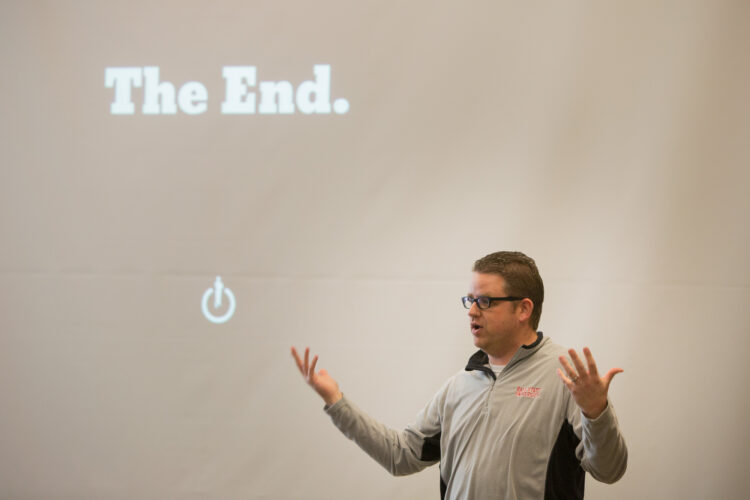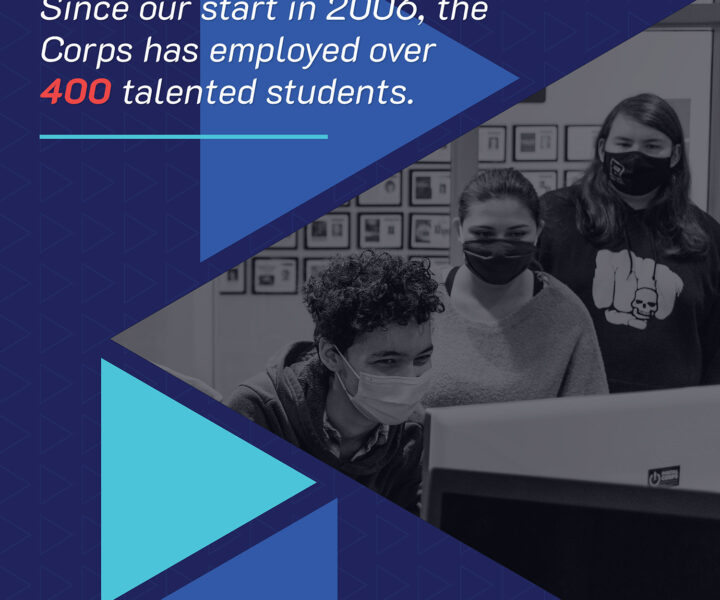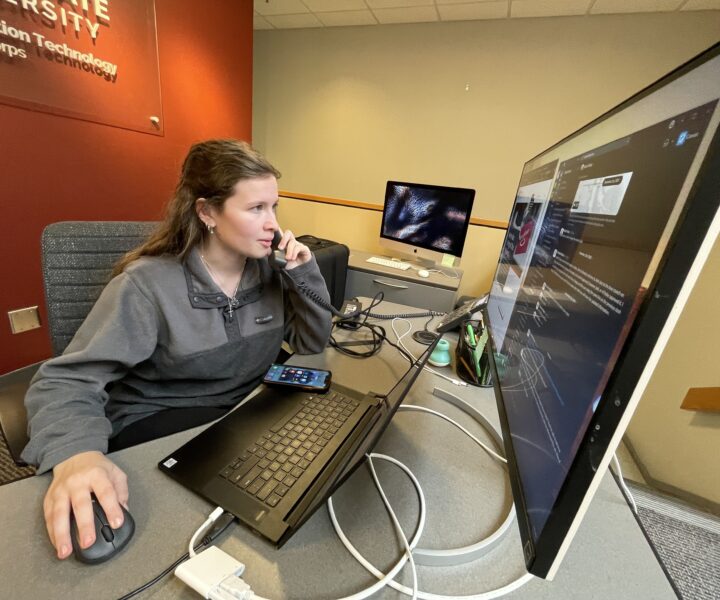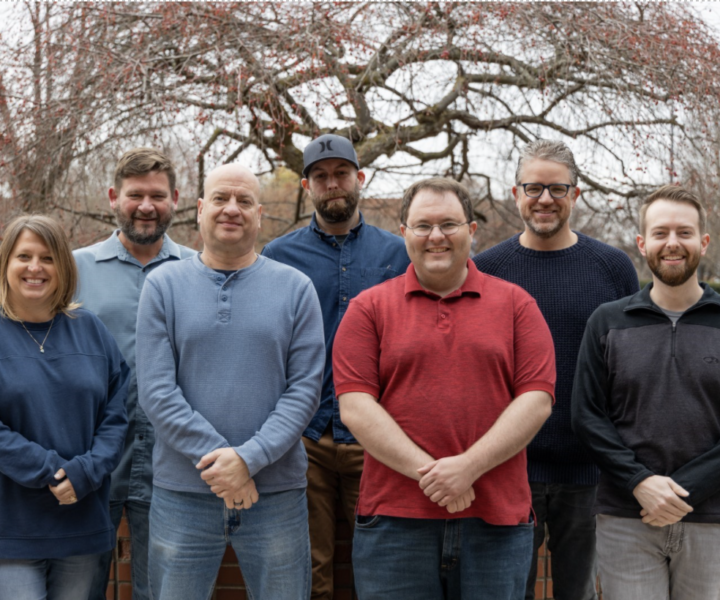I never saw myself as a leader, but then I started landing leadership positions. I was more surprised than anyone each time I landed another one.
When I started working at the Digital Corps in 2020, I was nervous to talk to people because I was just one introverted graduate assistant trying to connect with over 50 lively faces over Zoom and Slack messages. Some may stereotype introverts as people who don’t want to talk, but according to the American Psychological Association, introverts look inward to their own “thoughts and feelings, rather than toward the outer world of people and things.” It’s not that I didn’t want to talk; it just didn’t come as naturally to me. I was tasked with holding one-on-one check-ins with the Communication Team each week, and slowly but surely, after each conversation I felt more connected to the Corps, more like a leader.
It was difficult to tell who leaned toward introversion versus extroversion. According to WebMD, introverts and extroverts are on a scale, meaning one introvert may appear more introverted than others, and although I realized this, I assumed our Executive Director, Brandon Smith, was an extrovert because he spoke so smoothly and confidently in front of the whole Corps at our monthly All-Corps meetings. It turns out there are many introverts nestled in the Corps, including Smith!
Growing into Leadership

Smith isn’t usually the most talkative person in the Corps’ project meetings, but we can count on him to say something. He’s always ready with the right tidbit of perspective to amplify any project. But he wasn’t always willing to speak up in meetings. “I’ve probably got performance evaluations that reflect this. I would just get into meetings and situations with folks where I just didn’t want to speak up.” He didn’t lack confidence. He just struggled to express his own ideas around other people.
Smith eventually became more comfortable sharing his ideas, but he had to be deliberate about it by challenging himself to actually speak up in meetings. As he grew into leadership positions, he was no longer simply challenging himself to speak up. Smith says, “I am now expected to say something or lead a meeting or be the final say in something. So it’s not a matter of Should I say it?, When do I say it?, but it’s now, You are the one who needs to say things.”
In college, Smith minored in public speaking because he enjoys talking to people although people often questioned why he would willingly take more than the required speech class. He can speak just as well as an extrovert, but he responds to the situation differently than an introvert does. He uses his commute home as time to be alone and decompress after long days of speaking or attending meetings.
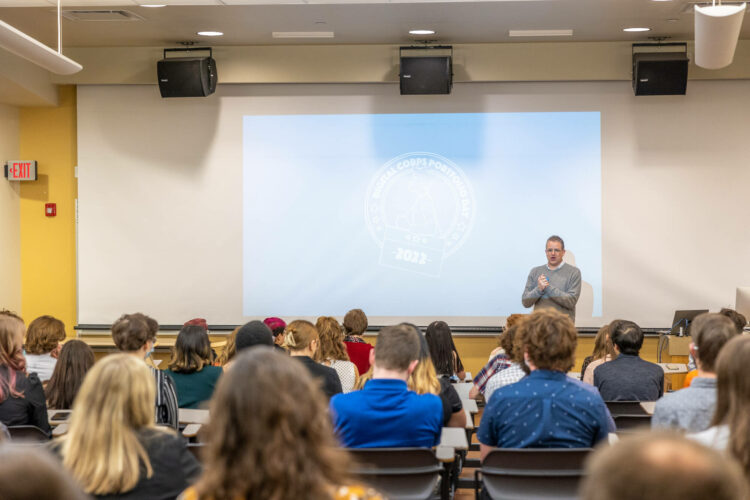
Smith isn’t the only introverted staff member at the Corps. Five out of our seven staff members say they lean toward being an introvert. Design Team Lead Riley Paulsen didn’t know of the term “introvert” until college, but before then, he recognized he was comfortable being alone and sitting through awkward pauses in conversations. In college, he learned what an introvert was and scored high on the introversion spectrum, and he says, “It was kind of a nice, refreshing thing. I’m not an extreme outlier. I’m just off to one side, and there are lots of other people on that side too.”
Paulsen doesn’t let his introversion stop him from making connections with students around the office. He is usually found either helping students with a project or stopping for a quick conversation with a student about some shenanigans. He says, “I can use my strengths as an introvert to kind of build close relationships with all the members of the team.” He focuses on building individual rapport because this helps him maintain good connections with the Design Team even though the group dynamic changes each year with students joining and leaving.
Maneuvering the Lively Office
The Corps’ office is lively with chatter and laughter, but we have many introverted students, including our student leaders. Right now, two out of four graduate assistants say they lean toward introversion, and three out of five masters lean toward introversion.

Video Team Master Lexi Esterle started working at the Corps at the beginning of her freshman year. She worked on training during her first semester, so she found it easy to not talk to her peers and instead seared her eyes with LinkedIn Learning courses. She struggled to know how to start conversations, but she found it much easier once she started working on projects because she had more in common with everyone.
Esterle became a master during Fall 2021. Masters are undergraduate student leaders who support the entire Corps, not just their team, so she became more deliberate about talking to people at the Corps: “You can’t wait for people to come to you with questions. You need to go up to new people and make them feel welcome, and those things don’t necessarily come naturally to me… I kind of have to be aware of what my responsibilities are and make that a deliberate choice consistently.”

Similar to Smith, Esterle enjoys public speaking. She does weather forecasting for NewsLink Indiana, and as a master, she has presented at the Corps, including important presentations for the President’s Cabinet and the Board of Trustees. She can present in the same way her extroverted peers do, but she prepares differently. While extroverts do warmups and talk before presenting, Esterle finds that distracting. Instead, she prefers to energize herself by sitting alone and reflecting. For weather forecasting, this includes reviewing the data one last time.

Project Management Graduate Assistant Kallie Hunchman also values spending time alone. Hunchman started working at the Corps during Summer 2021, and the then Assistant Director, Charity Coffman, asked her to check in with the fifteen other students working over the summer. “I thought I was losing my mind,” Hunchman says. “I had to go around and talk to every single person after having only known them for like two weeks.”
Of course, once the Fall semester started, she was exposed to over fifty students. She learned to adapt to the Corps by sitting in quieter corners of the office and talking to other introverts. “It has gotten better,” says Hunchman, “simply because I’ve learned to adjust where to put my social battery and where to not put my social battery. So if I’m at that point of the day where I’ve been here a while, and I’ve been talking to people all day, I’ll be like, Okay, it’s time for me to go home and recharge.” Even at home, Hunchman doesn’t push herself to mirror an extrovert. She gives herself space by ordering groceries online, instead of draining her social battery in the store, and she decompresses by painting, listening to music, and playing with her cat, Tulip.
Discovering the Internal Spark
Smith enjoys being an introvert because he feels that his hobbies align with his introversion and vice versa. He enjoys reading, and every Saturday morning, he hikes, giving him time to recharge. But he also values his introversion in the workplace. Being an introvert is by no means a death sentence in the workplace. Many workplace strengths, such as collaborating and public speaking, are typically associated with extroverts, but introverts have plenty of beneficial strengths that support work environments.
Smith says, “I have a fairly measured demeanor and like to think before I speak in most all situations. And I think that keeps me out of trouble sometimes and makes sure that I’m saying what I really mean to say. And I think that’s benefited me professionally.”
Hunchman uses her introversion to her advantage as a project manager because she is constantly talking to people and assigning tasks. “I feel like once I do get to know somebody, I do have a better relationship, and I am more understanding of when they need a moment.”
We have weekly meetings scheduled for each project, but Hunchman uses her skills as an introvert to assess a project’s progress. If one of her projects is running smoothly, she cancels their weekly meeting, giving the team more time to work on their tasks. No unnecessary meetings with her!

Esterle uses her strengths when building relationships too. Since introverts are typically inward and reflective, Esterle uses this to be aware of her peers’ social and emotional batteries. She says, “I usually have a good read on new people and their level of comfort in the office. I’m very cognizant of that because when I was in their shoes, I felt uncomfortable and nervous.”
Paulsen sees his introversion as a benefit to his creativity. The Corps prides itself on cultivating collaborative teams, but Paulsen says that creativity comes from looking internally. “There’s an inherent creativity inside each of us,” he says, “and you almost have to trigger your internal introvert to do that. So people that are super extroverted, when they go into full-on creative mode, they almost do kind of switch into a self-contained mode for a little bit.” Paulsen doesn’t have to try to be creative because thanks to his introversion, he explains that this internal creativity comes naturally to him.
He also finds his motivation from looking internally, which benefits him because he doesn’t have to wait for someone else to motivate him. He is perceived as the staff member who wears many hats around the Corps’ office. Of course, he is the Design Team Lead, but he is also helping the Development Team as the Corps searches for a full-time Dev Team Lead. And that doesn’t stop Paulsen from assisting the chorus of other students asking for help on projects. So whether he needs to learn something for the Corps or wants to learn something that’s trending in pop culture, he feels an internal drive to learn all that he can.

Since introversion and extroversion are on a scale, it’s not about dooming yourself to the introvert or extrovert label. It’s about knowing yourself and amplifying your strengths. Paulsen says, “You can certainly do everything that an extrovert can, and you have the chance to do it alone…you’re going to excel at that.”
I’ve learned to harness my introversion as a strength and no longer wish I was more extroverted. I love using my one-on-one check-in time with the Comm Team members to not only talk through project work or training, but also to get to know them. I value building those personable relationships—surrounded by conversations on weekend plans, class stress, and other ramblings—because that’s what helps us feel better connected.
